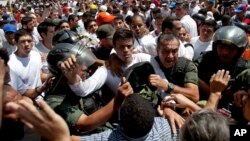Venezuelan opposition leader Leopoldo Lopez re-emerged from days of hiding Tuesday to address an anti-government demonstration and then handed himself over to security forces in Caracas.
The 42-year-old Harvard-educated economist who has spearheaded an opposition protest movement was wanted on charges including murder and terrorism. He said turning himself in will open the world's eyes to Venezuela's increasingly authoritarian socialist government.
Days of bloody anti-government street protests have resulted in four deaths. Lopez's Popular Will party is protesting soaring inflation, shortages in supermarkets, and rampant crime.
President Nicolas Maduro accuses Lopez of inciting violence and leading a U.S.-backed conspiracy to oust him from power.
On Monday, Maduro ordered the expulsion of three U.S. Embassy officials, after Washington came to Lopez's defense.
The State Department said Tuesday allegations the United States is helping to organize protests are "baseless and false.''
Spokeswoman Jen Psaki said Venezuela is trying "to distract from its own actions by blaming the United States,'' adding, "These efforts reflect a lack of seriousness on the part of the Venezuelan government to deal with the grave situation it faces.''
The State Department said Venezuela’s political future is for the Venezuelan people to decide and there is no room for violence by either side.
Before turning himself in to authorities, Lopez told about 5,000 supporters that he does not fear going to jail to defend his beliefs and constitutional right to peacefully protest.
He said, "I present myself to an unjust judiciary. They want to jail Venezuelans who want peaceful, democratic change."
Supporters of Lopez rerouted their protest march away from the central plaza in Caracas where pro-government oil workers planned their own demonstration.
Student-led protests have multiplied this month across the nation of 29 million people in the biggest challenge to Maduro since his election last year following Hugo Chavez's death.
Protest numbers, though, are smaller than mass movements in places such as Brazil, Ukraine and the Middle East.
The 42-year-old Harvard-educated economist who has spearheaded an opposition protest movement was wanted on charges including murder and terrorism. He said turning himself in will open the world's eyes to Venezuela's increasingly authoritarian socialist government.
Days of bloody anti-government street protests have resulted in four deaths. Lopez's Popular Will party is protesting soaring inflation, shortages in supermarkets, and rampant crime.
President Nicolas Maduro accuses Lopez of inciting violence and leading a U.S.-backed conspiracy to oust him from power.
On Monday, Maduro ordered the expulsion of three U.S. Embassy officials, after Washington came to Lopez's defense.
The State Department said Tuesday allegations the United States is helping to organize protests are "baseless and false.''
Spokeswoman Jen Psaki said Venezuela is trying "to distract from its own actions by blaming the United States,'' adding, "These efforts reflect a lack of seriousness on the part of the Venezuelan government to deal with the grave situation it faces.''
The State Department said Venezuela’s political future is for the Venezuelan people to decide and there is no room for violence by either side.
Before turning himself in to authorities, Lopez told about 5,000 supporters that he does not fear going to jail to defend his beliefs and constitutional right to peacefully protest.
He said, "I present myself to an unjust judiciary. They want to jail Venezuelans who want peaceful, democratic change."
Supporters of Lopez rerouted their protest march away from the central plaza in Caracas where pro-government oil workers planned their own demonstration.
Student-led protests have multiplied this month across the nation of 29 million people in the biggest challenge to Maduro since his election last year following Hugo Chavez's death.
Protest numbers, though, are smaller than mass movements in places such as Brazil, Ukraine and the Middle East.
